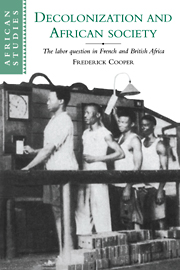Book contents
- Frontmatter
- Contents
- List of tables and figure
- Preface
- List of abbreviations
- Map of French and British colonial Africa
- 1 Introduction
- Part I The dangers of expansion and the dilemmas of reform
- Part II Imperial fantasies and colonial crises
- Introduction
- 5 Imperial plans
- 6 Crises
- Conclusion: modernity, backwardness, and the colonial state
- Part III The imagining of a working class
- Part IV Devolving power and abdicating responsibility
- Conclusion
- Notes
- Bibliography
- Index
- OTHER BOOKS IN THE SERIES
Introduction
Published online by Cambridge University Press: 22 February 2010
- Frontmatter
- Contents
- List of tables and figure
- Preface
- List of abbreviations
- Map of French and British colonial Africa
- 1 Introduction
- Part I The dangers of expansion and the dilemmas of reform
- Part II Imperial fantasies and colonial crises
- Introduction
- 5 Imperial plans
- 6 Crises
- Conclusion: modernity, backwardness, and the colonial state
- Part III The imagining of a working class
- Part IV Devolving power and abdicating responsibility
- Conclusion
- Notes
- Bibliography
- Index
- OTHER BOOKS IN THE SERIES
Summary
At the end of World War II, political leaders in Western Europe faced what seemed to be an open future, perhaps a dangerously open future. The old structures of power and habits of discourse had been shaken and it was not clear what would take their places. The ascendancy on the global stage of the United States and the Soviet Union – whose imperial visions and ambitions took quite different forms – reshaped the nature of the international community within which the morality and the politics of imperial rule were being discussed. Great Britain and France found themselves on the defensive in the colonies in the moment of victory in Europe. Domestic politics affected the way in which colonial issues were addressed: the end of the war brought about a dual focus on the politics of production and of welfare. In conditions of acute material hardships, cross-class bargaining centered on management efforts to increase output in exchange for social protections for workers. Both international and domestic contexts fostered among high officials a conception of society as something to be managed, as something with a general logic that could be understood and controlled. The old claims to colonial authority based on superiority of race and civilization were thoroughly discredited by the experience of Nazism and fascism, whereas universalistic notions of social progress – based on knowledge and capital resources - offered a seemingly more plausible basis for assertions of imperial hegemony.
- Type
- Chapter
- Information
- Decolonization and African SocietyThe Labor Question in French and British Africa, pp. 173 - 175Publisher: Cambridge University PressPrint publication year: 1996



